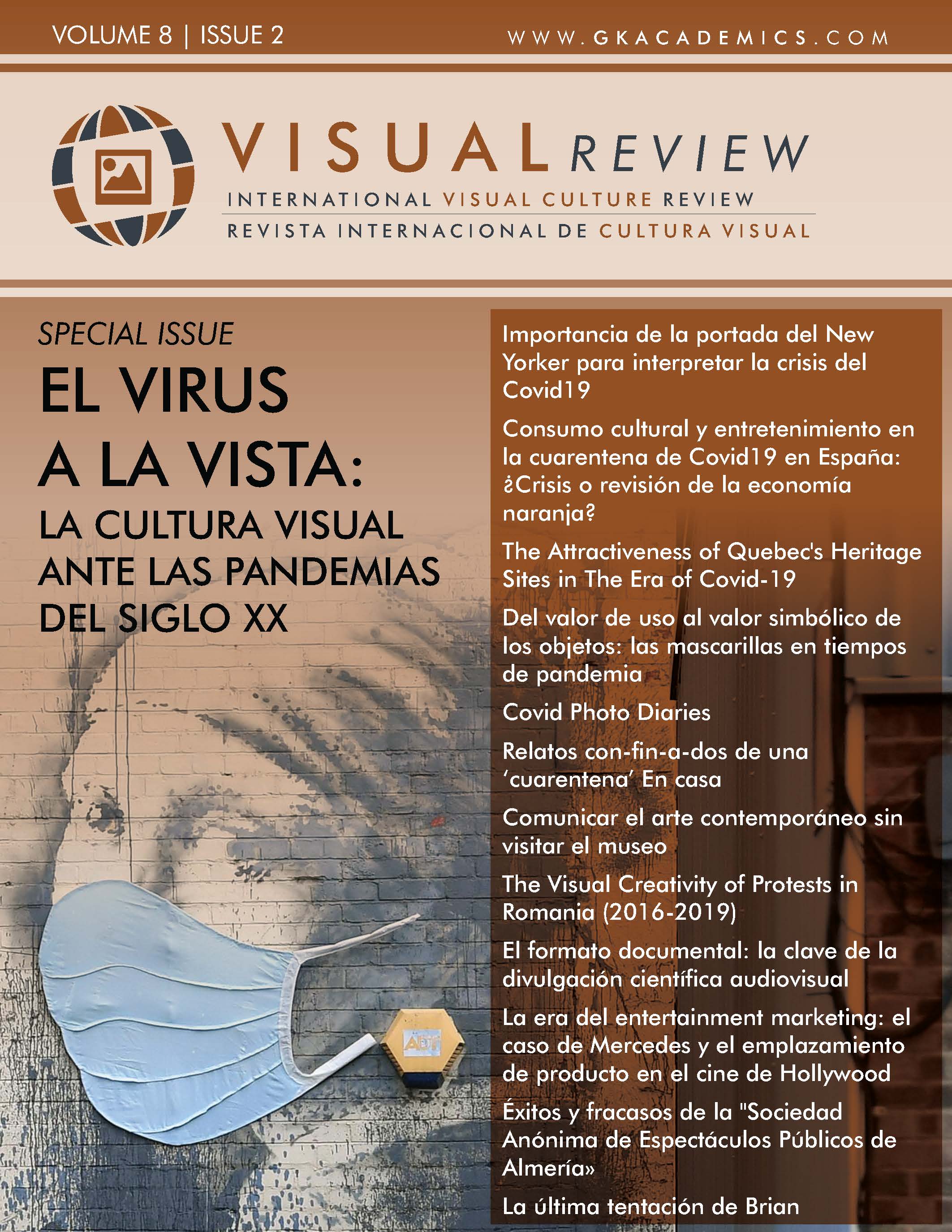Cultural consumption and entertainment in the Covid-19 lockdown in Spain: Orange economy crisis or review?
DOI:
https://doi.org/10.37467/gka-revvisual.v8.2805Keywords:
Cultural Industry, Entertainment, Covid-19, Consumption, Wellbeing EconomicsAbstract
This is a socio-economic study on the state of cultural industries and entertainment in Spain during the confinement for Covid-19. An analysis is carried out on what type of cultural offer has been consumed, as well as the way and way of doing it. To do this, a group of citizens was interviewed, using a questionnaire, where they were asked about the type of cultural products and services used as entertainment during confinement. Also, the channels managed were investigated, with special attention to streaming platforms and the most used digital tools. Finally, there is a global review.
Downloads
Global Statistics ℹ️
|
1755
Views
|
838
Downloads
|
|
2593
Total
|
|
References
Aced, C. (2018). Relaciones Públicas 2.0. Editorial UOC.
Adorno, T., Horkheimer, M. (1947). Dialektik der Aufklärung. Verlag.
Andreu, A., et al. (2019). Claves de Administración y Dirección de Empresas en la Posglobalización. Delta Publicaciones.
Behar, D. (2008). Metodología de la investigación. Editorial Shalom.
Berganza, R., Ruíz, J. (2005). Investigar en Comunicación. McGraw-Hill.
Bonet, L., Chávez, M. (2018). Tendencias, retos y tensiones globales de la gestión cultural y su formación . Rev. Investigación en Gestión Cultural, 3 (4): 1-12. DOI: https://doi.org/10.32870/cor.a3n4.7113
Bourdieu, P. (1991). La distinción. Criterio y clase social del gusto (Trad.). Taurus.
Bustamante, E. (2018). Las industrias culturales y creativas. Rev. Análisis de la cultura y el territorio, 18: 88-117. DOI: https://doi.org/10.25267/Periferica.2017.i18.08
Caravaggio, L. (2016). Economía y felicidad. Estudios Económicos, 67: 97-118. DOI: https://doi.org/10.52292/j.estudecon.2016.719
Cazau, P (2006). Introducción a la investigación en ciencias sociales. Galeón.
Claussen, D (2011). Industria cultural, ayer y hoy. Constelaciones, 3: 315-321.
Corbetta, P. (2007). Metodología y técnicas de investigación social. McGraw Hill.
Dupont, L. (2019). Agile innovation. Journal of Innovation Economics & Management, 28: 1-5. DOI: https://doi.org/10.3917/jie.028.0001
Gómez, M. (2006). Introducción a la metodología de la investigación científica. Brujas.
Hernández, R., et al. (2010). Metodologías de investigación. McGraw-Hill.
Krober, C. y Kluckholn, L. (1952). Culture: A Critical Review of Concepts and Definitions. Papers of the Peabody Museum of American Archeology and Ethnology, 47(1): 283-95.
Manzanero, D., et al. (2014). Philosophical challenges of plurality in a global World. Cambridge Scholars Pub.
Martín, C. (2008). Metodología de investigación en estudios de usuarios. Revista General de Información y Documentación, 17(2): 129-49.
Martín-Crespo, C., Salamanca, A. (2007). El muestreo en la investigación cualitativa. Nure Investigación, 27: 1-4.
Oliva, C. (2011). Investigación, Comunicación y encuestas. En VV.AA., Investigar la Comunicación en España. (p. 337-348). URJC.
Pou, M. (2003). La crítica y los nuevos productos culturales electrónicos. Estudios Sobre El Mensaje Periodístico, 9: 27-32.
Primo, W. (2017). Ocio productivo, entretenimiento e industria cultural. UPGTO Management Review, 2(2): 1-19.
Rojas, M. (2014). El estudio científico de la felicidad. FCE.
Rodríguez, R. (2011). De industrias culturales a industrias del ocio y creativas. Comunicar, 36: 149-56.
Sánchez-Bayón, A. (2016). Problemas y retos para alcanzar la sociedad del conocimiento. Delta Publicaciones.
Sánchez-Bayón, A. (2017). Revelaciones conceptuales y lingüísticas de la posglobalización, Carthaginensia, 33(64): 411-58.
Sánchez-Bayón, A. (2018). Balance de la Sociología tras la globalización. Eduser, 10: 49-68.
Sánchez-Bayón, A. (2019a). Problemas convergentes de derecho, economía y sociología en la posglobalización, Derecho y Cambio Social, 57: 12-41.
Sánchez-Bayón, A. (2019b). Transición a la economía gig: claves de sociología empresarial y laboral, Encuentros multidisciplinares, 21(62): 1-19.
Sánchez-Bayón, A. (2019c). Una historia crítica de sociología del trabajo y de las organizaciones, Miscelánea Comillas, 77(151): 431-51. DOI: https://doi.org/10.14422/mis.v77.i151.y2019.008
Sánchez-Bayón, A. (2020a). Renovación del pensamiento económico-empresarial tras la globalización: Talentism & Happiness Economics. Bajo Palabra, 24: 293-318. DOI: 10.15366/bp2015.10.022 DOI: https://doi.org/10.15366/bp2015.10.022
Sánchez-Bayón, A. (2020b). Una Historia de RR.HH. y su transformación digital: Del fordismo al talentismo y la gestión de la felicidad. Rev. Asociación Española de Especialistas de Medicina del Trabajo, 29(3). 198-214.
Sánchez-Bayón, A., Trincado, E. (2020). Business and labour culture changes in digital paradigm: rise and fall of human resources and the emergence of talent development. Cogito. Multidisciplinary Research Journal, 12(3). 225-243.
Sánchez Ruíz, E. (2006). Industrias Culturales, Diversidad y Pluralismo en América Latina. CIC. Cuadernos de información y Comunicación, 11: 207-21.
Scheaffer, R., et al. (2007). Elementos de muestreo. Paraninfo.
Taleb, N. (2012). Antifragile. Random House.
Valero, J., Sánchez-Bayón, A. (2018). Balance de la globalización y teoría social de la posglobalización, Dykinson.
VV.AA. (2010). Políticas para la creatividad (Trad.). UNESCO.
VV.AA. (2019). Encuesta de hábitos y prácticas culturales en España 2018-2019. MECD.
VV.AA. (2020). World Economic Outlook: the great lockdown. IMF.
Zallo, R. (1988). Economía de la cultura. Akal.
Downloads
Published
How to Cite
Issue
Section
License
Those authors who publish in this journal accept the following terms:
-
Authors retain copyright.
-
Authors transfer to the journal the right of first publication. The journal also owns the publishing rights.
-
All published contents are governed by an Attribution-NoDerivatives 4.0 International License.
Access the informative version and legal text of the license. By virtue of this, third parties are allowed to use what is published as long as they mention the authorship of the work and the first publication in this journal. If you transform the material, you may not distribute the modified work. -
Authors may make other independent and additional contractual arrangements for non-exclusive distribution of the version of the article published in this journal (e.g., inclusion in an institutional repository or publication in a book) as long as they clearly indicate that the work was first published in this journal.
- Authors are allowed and recommended to publish their work on the Internet (for example on institutional and personal websites), following the publication of, and referencing the journal, as this could lead to constructive exchanges and a more extensive and quick circulation of published works (see The Effect of Open Access).














